| Srl | Item |
| 1 |
ID:
052176
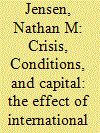

|
|
|
|
|
| Publication |
April 2004.
|
| Summary/Abstract |
A selection model for 68 countries between 1970 and 1998 is used to test the impact of International Monetary Fund(IMF) programs on international capital markets and examine how agreements are perceived by multinational investors. Results reveal that even after controlling for the factors that lead countries to seek IMF support, IMF agreements lead to lower levels of foreign direct investment (FDI). Countries that sign IMF agreements, ceteris paribus, attract 25% less FDI inflows than countries not under IMF agreements.
|
|
|
|
|
|
|
|
|
|
|
|
|
|
|
|
| 2 |
ID:
052178
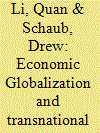

|
|
|
|
|
| Publication |
April 2004.
|
| Summary/Abstract |
The effect of economic globalization on the number of transnational terrorist incidents within countries is analyzed statistically, using a sample of 112 countries from 1975 to 1997. Results show that trade, foreign direct investment (FDI), and portfolio investment have no direct positive effect on transnational terrorist incidents within countries and that economic developments of a country and its top trading partners reduce the number of terrorist incidents inside the country. To the extent that trade and FDI promote economic development, they have an indirect negative effect on transnational terrorism
|
|
|
|
|
|
|
|
|
|
|
|
|
|
|
|
| 3 |
ID:
052177
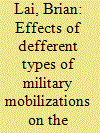

|
|
|
|
|
| Publication |
April 2004.
|
| Summary/Abstract |
One dominant explanation for why crises escalate to war is based on misperception. Alternative rational explanations for why crises escalate to war are examined, including commitment problems, the cost of revealing military advantages, and a desire for greater future gains. These explanations for war argue that states are likely to prefer a military to a diplomatic solution and to mobilizetheir militaries to maximize a surprise attack advantage. This type of mobilization (private) is different from mobilization by states seeking a diplomatic advantage (public) because states are trying to avoid revealing information. When one state in a crisis mobilizes privately, war is more likely because one state is committed to conflict whereas the other is not receiving signals of an impending conflict. The effect of private mobilization on war is tested using the International Crisis Behavior data. The results demonstrate that private mobilization is likely to lead to war.
|
|
|
|
|
|
|
|
|
|
|
|
|
|
|
|
| 4 |
ID:
052179
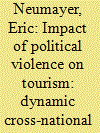

|
|
|
|
|
| Publication |
April 2004.
|
| Summary/Abstract |
The hypothesis that political violence deters tourism is mainly based on case study evidence and a few quantitative studies confined to a small sample of countries. Two estimation techniques-a fixed-effects panel estimator with contemporaneous effects only and a dynamic generalized method of moments estimator-are used to test the impact of various forms of political violence on tourism. Both models show strong evidence that human rights violations, conflict, and other politically motivated violent events negatively affect tourist arrivals. In a dynamic model, even if autocratic regimes do not resort to violence, they have lower numbers of tourist arrivals than more democratic regimes. Results also show evidence for intraregional, negative spillover, and cross-regional substitution effects
|
|
|
|
|
|
|
|
|
|
|
|
|
|
|
|
| 5 |
ID:
052174
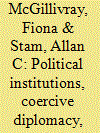

|
|
|
|
|
| Publication |
April 2004.
|
| Summary/Abstract |
A theory of sanction duration that focuses on differences between democratic and nondemocratic states in the structure of leaders' support coalitions is tested, using a hazard model to analyze a data set of 47 sanction events with 272 observations. Results show that leadership change strongly affects the duration of sanctions only in the case of nondemocratic states. Leadership change in democratic states is unrelated to the duration of sanctions; however, leadership change in nondemocratic sender and nondemocratic target states is strongly related to the ending of economic sanctions
|
|
|
|
|
|
|
|
|
|
|
|
|
|
|
|
| 6 |
ID:
052173
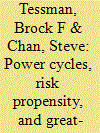

|
|
|
|
|
| Publication |
April 2004.
|
| Summary/Abstract |
The theory of power cycles contends that the growth and decline of national power holds the key to understanding the occurrence of extensive wars. Certain critical points in a state's power trajectory are especially dangerous occasions for such armed clashes. The power cycles of nine major states during the period from 1816 to 1995 are examined, and prospect theory is used to derive expectations about the risk propensity of states during different periods in their power cycle. These expectations are in turn applied to an analysis of deterrence encounters among the major states. Results show that critical points tend to incline states to initiate deterrence confrontations and escalate them to war. Democratic states, however, are less susceptible to these tendencies than authoritarian ones. Results also show that changes in power trajectories do affect the occurrence and outcome of deterrence encounters among the great powers.
|
|
|
|
|
|
|
|
|
|
|
|
|
|
|
|
| 7 |
ID:
052175


|
|
|
|
|
| Publication |
April 2004.
|
| Summary/Abstract |
How people distribute income is investigated, using participants in two experimental treatments-one with and the other without a veil of ignorance. The experiment tests two major hypotheses: (1) the veil of ignorance generates Rawlsian choices, and (2) equal bargaining power and the veto rule generate Rawlsian choices, even though there is no veil of ignorance. Rawlsian choices are defined as those that maximize the income of the lowest income group. Results show that the proportion of Rawlsian choices is bigger in those groups in which there is no veil of ignorance. In group discussions, arguments related to justice are also more common in the no veil of ignorance than in the veil of ignorance treatment.
|
|
|
|
|
|
|
|
|
|
|
|
|
|
|
|